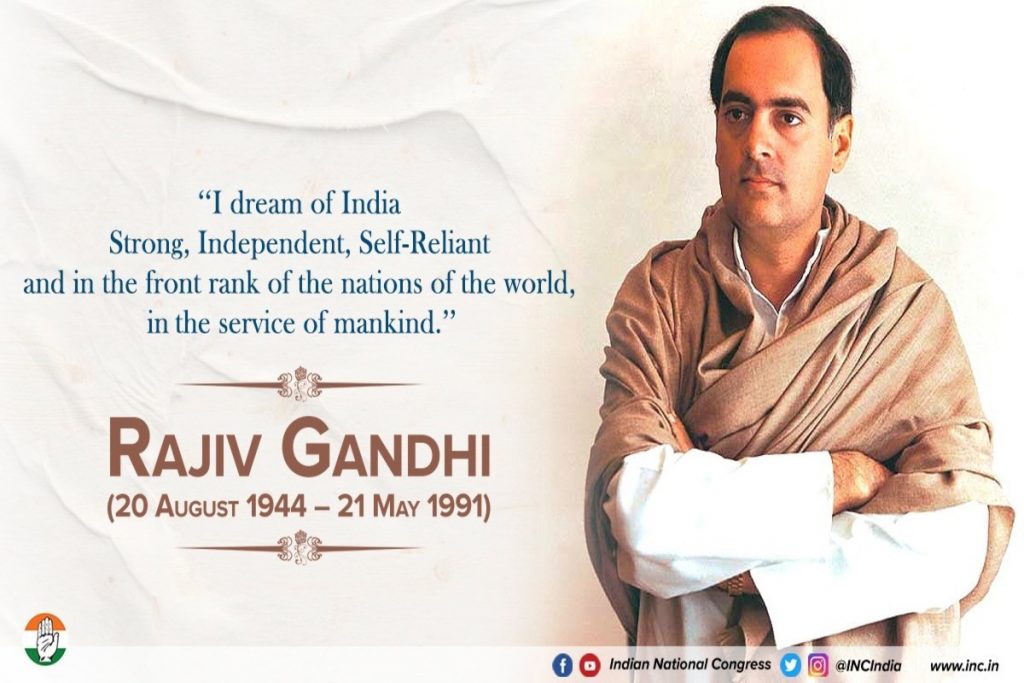


India pays homage to former Prime Minister Rajiv Gandhi on his birth anniversary. Remembered as the nation's youngest prime minister, his visionary policies and initiatives laid the foundation for a modern India. Assassinated in 1991, Rajiv's legacy lives on as the country celebrates Sadbhavana Diwas. His contribution, including lowering the voting age, empowering women, and promoting education, continue to shape the future of the nation. Congress leaders Rahul Gandhi and Mallikarjun Kharge pay tribute to Rajiv's remarkable leadership and unwavering commitment to progress.
Honoring Rajiv Gandhi: India's Visionary Prime Minister
Background:
Rajiv Gandhi, born on August 20, 1944, was the sixth Prime Minister of India, serving from 1984 to 1989. He was the youngest person to hold the office and the second-youngest prime minister in the world. Gandhi's tenure marked a significant period of transformation and modernization for India.
Visionary Policies:
Rajiv Gandhi is widely regarded for his visionary policies and initiatives that laid the foundation for a modern India. He played a pivotal role in:
Legacy:
Gandhi's assassination in 1991 by a suicide bomber from the Liberation Tigers of Tamil Eelam (LTTE) cut short his promising leadership. Despite his untimely demise, his legacy continues to shape the nation. His visionary policies have transformed India into a global economic powerhouse, and his commitment to education and youth empowerment remains a guiding principle for the country.
Sadbhavana Diwas:
In honor of Rajiv Gandhi's birth anniversary, India observes August 20 as Sadbhavana Diwas (Harmony Day). This day is dedicated to promoting communal harmony, peace, and understanding among all citizens. It serves as a reminder of Gandhi's unwavering belief in unity and his efforts to bridge religious and social divides.
Top 5 FAQs:
1. Why was Rajiv Gandhi assassinated? Rajiv Gandhi was assassinated by a suicide bomber from the Liberation Tigers of Tamil Eelam (LTTE) during an election rally in Sriperumbudur, Tamil Nadu.
2. What was Rajiv Gandhi's economic policy known as? Rajiv Gandhi's economic policy was known as liberalization, which involved reducing trade barriers and encouraging foreign investment.
3. Who is the current Prime Minister of India? Narendra Modi is the current Prime Minister of India.
4. When is Sadbhavana Diwas observed? Sadbhavana Diwas is observed on August 20, the birth anniversary of Rajiv Gandhi.
5. Who are Rajiv Gandhi's children? Rajiv Gandhi had two children: Rahul Gandhi and Priyanka Gandhi Vadra.

In honor of World Polio Day, local restaurants in Minnesota are teaming up for the "End Polio Now" event to raise awareness and funds for polio eradication. From 7 a.m. to 7 p.m., residents are encouraged to dine at participating restaurants where volunteers will educate them on the impact of polio worldwide and how to help. The event's signature sponsor, Eagle Rock, along with other local restaurants, will donate proceeds to Rotary International, which uses funds to provide polio vaccines to children in vulnerable areas. This effort is crucial given that polio continues to be a problem in some parts of the world, even though it has been eliminated in the US since 1979.

In a tightly contested race for the Rajya Sabha seats in Jammu & Kashmir, the ruling NC alliance emerged victorious, securing three out of the four seats. The BJP, which held only 28 seats in the Assembly, had hoped for a win through cross-voting or support from smaller groups. However, the NC's dominant position in the 88-member Assembly reaffirmed voter trust in their post-Article 370 political stability. PDP President Mehbooba Mufti also congratulated the NC candidates and expressed hope that they will strongly represent the people of Jammu & Kashmir in Parliament.

Mayor Derek Slaughter has vetoed a recent city ordinance that limits the terms of elected officials, citing concerns about retroactivity and lack of language addressing current officials. This veto comes after the ordinance was adopted in a 6-0 vote by City Council, with the mayor absent. If legally challenged, the defense of this ordinance could result in unnecessary costs for taxpayers. The mayor's decision has sparked a response from council members, with attempts to reach them for comment.

Prime Minister Narendra Modi addressed his first election rally in Bihar and expressed confidence in winning the upcoming polls. He mocked the opposition INDIA bloc and praised the unity within NDA, highlighting leaders like Nitish Kumar, Chirag Paswan, Jitan Ram Manjhi, and Upendra Kushwaha. Modi also criticized the 'jungle raj' under RJD and Congress and highlighted Bihar's progress under Nitish Kumar's tenure. Despite the upcoming Chhath festival, the PM thanked the crowd for attending and described the recent GST rate revision as a 'festival of savings'.

The suspension of Praveen Kumar K P, a PDO serving in Sirwar taluk of Raichur district, for participating in an RSS rally has sparked controversy in Karnataka. BJP leaders have condemned the move and promised to fight it legally, claiming that the officer's right to participate in such events is protected by law. Meanwhile, the state's Rural Development Minister has written to the Chief Minister for a ban on RSS activities on government premises, further intensifying the issue.

In a heated verbal exchange, Maratha quota activist Manoj Jarange Patil accused NCP Minister Chhagan Bhujbal of attempting to create a rift between the OBC and Maratha communities for political gain. During a recent OBC rally in Beed, Bhujbal and Dhananjay Munde attacked Jarange, with Pankaja Munde, a BJP OBC leader, watching from the sidelines. Jarange also praised Chief Minister Devendra Fadnavis and Minister Pankaja Munde for staying away from the rally and emphasized the unity of the OBC community. Bhujbal, on the other hand, warned Jarange against challenging the community's rights and vowed to stand up against any attempts to divide them.

On the auspicious occasion of Bhai Dooj, Madhya Pradesh Chief Minister Mohan Yadav transferred a total of 44,900 crore directly into the bank accounts of 1.27 crore women beneficiaries under the Ladli Bahna Yojana. This initiative aims to support and empower women in the state, with each eligible woman set to receive 1,500 per month from November onwards. During the special program at the Chief Minister's residence, Yadav extended his wishes for a happy Bhai Dooj, emphasizing the importance of the brother-sister relationship and the government's commitment towards ensuring the safety and well-being of Ladli Bahnas in the state.

Union Home Minister Amit Shah celebrated the Gujarati New Year and his 62nd birthday in his hometown of Ahmedabad, surrounded by senior political leaders, party members, and well-wishers. Shah's rise in public life through the RSS and his partnership with Prime Minister Narendra Modi have shaped Gujarat's and India's political narrative. His sharp organisational mind, efficient approach, and booth-level political management have been key in building the "Gujarat model" that gave the BJP an enduring edge. Despite transitioning to national politics, Shah's political heart still beats in Ahmedabad, as evident in his New Year celebrations and plans to meet the newly appointed ministers of the Gujarat cabinet.

In a recent incident at the Vasai Fort in Maharashtra, a man dressed as Chhatrapati Shivaji Maharaj got into a heated argument with a security guard over language. The man, who was recording a video, berated the guard for not speaking Marathi and disrespecting the legacy of Shivaji Maharaj. Social media users were divided in their opinions, with some criticizing the man's behavior while others felt the guard needed to be taught a lesson.

In a significant moment for gender equality, President Droupadi Murmu became the first woman to visit the Lord Ayyappa Temple in Sabarimala. Accompanied by her team, she performed Darshan and Puja at the shrine, praying for the well-being and prosperity of her fellow citizens. Her visit symbolized the Supreme Court's decision to lift the ban on menstruating women entering the temple, reminding us that devotion knows no gender barriers.